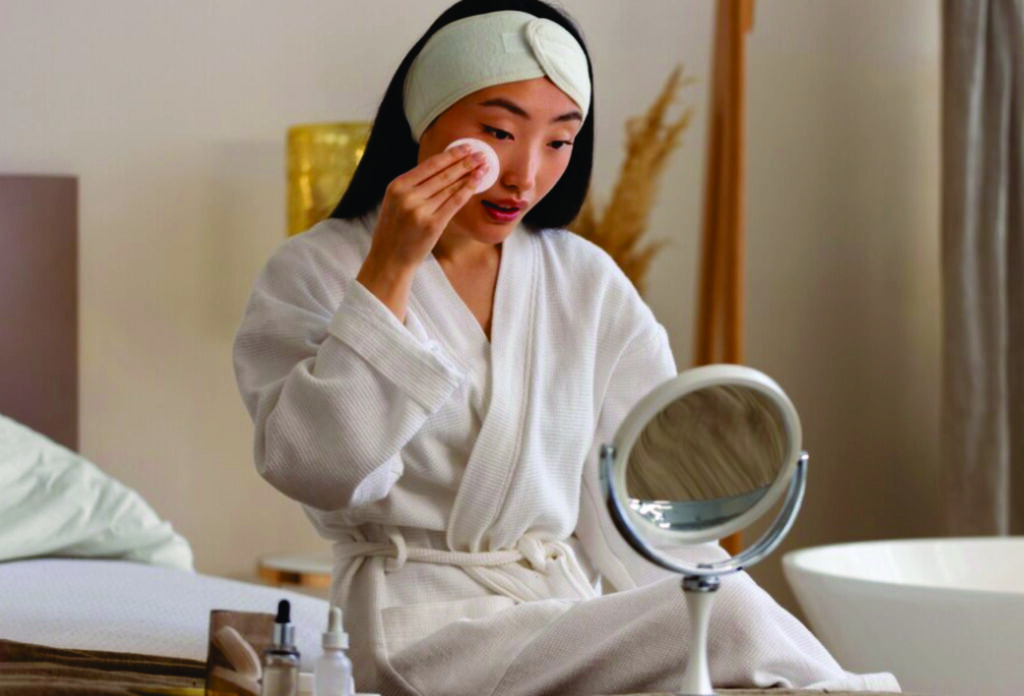Your skin often reflects what’s happening inside. While topical skincare routines are helpful, the real, lasting glow comes from how you live and eat. Nutrition and lifestyle together form the foundation of skin health. Every bite, sip, hour of rest, and stress level can shape your skin’s texture, tone, resilience, and radiance. This is not just a catchy phrase—multiple studies confirm that diet, microbiota, micronutrients, and daily habits directly influence skin condition.

The Science Behind Diet and Skin Health
A clinical review titled Dietary Influences on Skin Health in Common Dermatologic Conditions highlights an important fact. Diet plays a key role in processes that affect skin health, aging, and disease.
Another review, Nutritional Dermatology: Optimizing Dietary Choices for Skin Health, adds more evidence. Vitamins A, C, D, E, and minerals like zinc and selenium regulate oxidative stress and skin inflammation.
A separate study, Dietary nutrient intakes and skin-aging appearance among middle-aged American women, found a strong link. Higher intake of vitamin C and linoleic acid (omega-6) correlated with a better skin-aging appearance.
In short, nutrition is not a side factor—it is one of the central pillars of skin health.
Essential Nutrients for Healthy Skin
Vitamins A, C, E, and D
- Vitamin A (retinol, beta-carotene) supports skin cell turnover and reduces dryness.
- Vitamin C is a powerful antioxidant, critical for collagen synthesis, pigmentation control, and UV stress defense.
- Vitamin E helps protect skin lipids from oxidative damage and improves hydration.
- Vitamin D, though often discussed outside of beauty, is vital for immune pathways and inflammation regulation in the skin.
These vitamins often work in synergy: vitamin E enhances the protective effects of vitamin C, while vitamin D ensures immune resilience.
Minerals: Zinc, Selenium, Copper
The review Role of Nutritional Elements in Skin Homeostasis highlights how mineral deficiencies impair skin structure and function.
- Zinc aids in wound healing, reduces inflammation, and supports DNA synthesis.
- Selenium strengthens antioxidant defenses such as glutathione peroxidase.
- Copper is essential for collagen and elastin synthesis.
Fatty Acids: Omega-3 and Omega-6
Polyunsaturated fatty acids, particularly omega-3s (EPA, DHA), support the lipid barrier, improve hydration, and reduce redness. They may also provide photoprotection.
A group of researchers in their study on micronutrients and fatty acids, emphasized the role of these nutrients in slowing photoaging
Sugar, Glycation, and Skin Aging
High sugar intake accelerates glycation—a process where sugar molecules bind to proteins like collagen and elastin, damaging their structure. This leads to reduced elasticity, sagging, and wrinkles. Lowering sugar and refined carbs helps preserve youthful skin.
The Gut–Skin Axis
One of the most exciting discoveries in recent years is the gut–skin axis.
The review The Role of Probiotics in Skin Health and Related Gut–Skin Axis shows that gut microbiota influences skin through immune, inflammatory, and oxidative pathways.
Unraveling the Gut–Skin Axis explores how imbalances in gut flora contribute to skin disorders, while restoring balance improves outcomes.
Another review, Rosacea, microbiome and probiotics, links microbiota changes to chronic conditions like rosacea and highlights the potential of probiotics.
Practical steps:
- Eat fermented foods (yogurt, kefir, sauerkraut).
- Include prebiotic-rich foods (oats, garlic, onions).
- Consider probiotics under medical guidance.
- Limit unnecessary antibiotics and high sugar intake that harm gut balance.
Hydration: More Than Just Drinking Water
Water is the skin’s natural moisturizer. It maintains elasticity and smoothness. Besides plain water, hydration also comes from water-rich foods like cucumbers, citrus, and watermelon. Limiting alcohol and excess caffeine is equally important.
Sleep: The Nighttime Repair Mechanism
Quality sleep is essential for collagen synthesis, oxidative stress repair, and hormonal balance. Poor sleep increases cortisol, which triggers acne, inflammation, and delayed healing.
Creating a bedtime ritual, reducing screen exposure, and sticking to a regular schedule greatly enhance skin health.
Exercise, Circulation, and Skin Nourishment
Physical activity boosts circulation, delivering oxygen and nutrients to skin cells while aiding detoxification. Even moderate activities like walking and yoga can improve glow. Exercise also lowers cortisol, reducing stress-related breakouts.
From personal experience: I used to consume huge amounts of sweets daily, which left me overweight, guilty, and struggling with dull, inflamed skin. Gradually introducing daily movement—starting with walks and light yoga—reduced my sugar cravings, lifted my mood, and noticeably improved my complexion.
Harmful Habits That Damage Skin
Even with a balanced diet, some lifestyle choices can undo progress and accelerate skin aging.
- Smoking. Beyond causing wrinkles, smoking reduces blood flow to the skin, depriving it of oxygen and essential nutrients. It damages collagen and elastin, leading to sagging and leathery texture. Research shows smokers develop wrinkles earlier and more prominently than non-smokers.
- Excessive alcohol. Alcohol acts as a diuretic, flushing fluids from the body and leaving skin dehydrated. Over time, this leads to broken capillaries, puffiness, and dullness. Heavy drinking also impairs vitamin absorption, especially vitamin A, which is vital for skin renewal.
- High-sugar diets. A consistently high-sugar diet not only causes glycation but also triggers inflammation, contributing to acne flare-ups and worsening conditions like eczema. Processed sweets and sugary drinks are especially harmful.
- Chronic stress. Stress increases cortisol, which breaks down collagen and weakens the skin’s protective barrier. It can also worsen acne, psoriasis, and rosacea. Managing stress through meditation, journaling, or breathing exercises directly benefits skin clarity and resilience.
Practical Tips for Everyday Skin Health
Building radiant skin isn’t about overnight changes—it’s about steady, sustainable habits.
- Plan nutrient-dense meals. Every plate should feature colorful vegetables, lean proteins, and healthy fats like olive oil or avocado. This combination fuels collagen production and keeps inflammation in check.
- Hydrate consistently. Aim for 1.5–2 liters of water daily, but remember hydration also comes from soups, teas, and fruits. Adding lemon or cucumber can make water more enjoyable.
- Support your gut. Add fermented foods like kimchi, miso, or kombucha to your diet. Pair them with prebiotic-rich choices such as bananas, oats, and asparagus to nourish healthy gut bacteria.
- Prioritize sleep. Develop a relaxing evening routine—dim lights, read a book, or practice gentle stretches. Aim for 7–9 hours each night to allow skin to repair and renew.
- Move daily. Whether it’s brisk walking, yoga, or cycling, exercise supports circulation and stress management. Try to get at least 150 minutes of moderate activity weekly.
- Protect externally. Skincare routines should be tailored, but universally, gentle cleansing, daily moisturizing, and consistent SPF 30+ use are essential. Don’t forget hands, neck, and décolletage.
Seasonal and Climate Considerations
Your skin’s needs shift with the seasons and climate. Adjusting routines helps maintain balance.
- Winter / dry climates. Cold air and indoor heating strip moisture. Use richer creams, facial oils, and consider a humidifier to combat dryness.
- Summer / hot climates. Sweat and sun exposure increase oxidative stress. Lightweight gels, antioxidant serums (like vitamin C), and frequent sunscreen reapplication are critical.
- Transition seasons (spring, autumn). Rapid shifts in temperature and humidity can confuse skin. Focus on gentle exfoliation and barrier-strengthening moisturizers to ease transitions.
- High-altitude or sunny regions. Stronger UV rays demand higher SPF and antioxidant support. Lip balms with SPF are also crucial.
Why This Works: A Biological Perspective
Understanding the mechanisms helps solidify why nutrition and lifestyle matter so much.
- Nutrients fuel repair. Vitamins and minerals are building blocks for collagen, elastin, and antioxidant enzymes that defend against free radicals.
- Gut balance reduces inflammation. A thriving microbiome lowers systemic inflammation, which translates to calmer, clearer skin.
- Hormonal regulation through rest and exercise. Consistent sleep and movement stabilize hormones like cortisol and insulin, both of which influence skin health.
- Circulation delivers essentials. Exercise-driven blood flow carries oxygen and nutrients directly to skin cells, aiding renewal.
- Avoiding harmful habits protects integrity. Limiting smoking, alcohol, sugar, and stress safeguards cellular structures and slows visible aging.
Conclusion
Radiant skin is not created by creams alone—it is built day by day through nutrition and lifestyle.
Invest in yourself with:
- balanced nutrition
- micronutrients and fatty acids
- gut health
- quality sleep
- consistent movement
- protection from harmful habits
I’ve lived this journey myself. Reducing sugar, exercising gently, and choosing whole foods transformed not only my skin but also my energy and confidence. Beauty truly begins within, and with mindful choices, your skin will reflect your healthiest self.
How to Choose a Basic Skincare Routine Based on Your Skin Type

I’m Victoria, the creator behind Eva My Balance. Passionate about beauty, wellness, sustainable living, and mindful self-care. My mission is to inspire you to live consciously and beautifully—inside and out.




